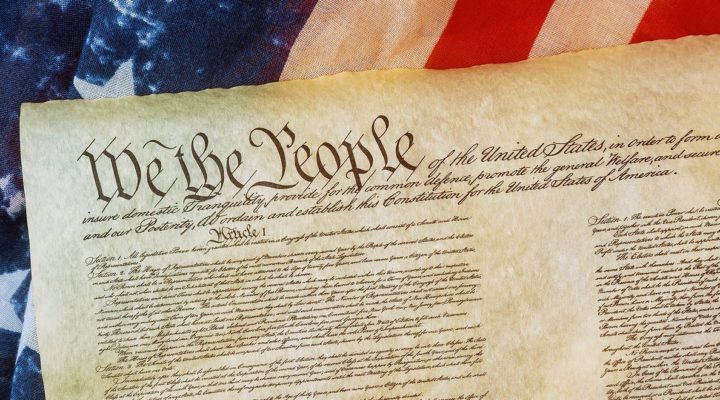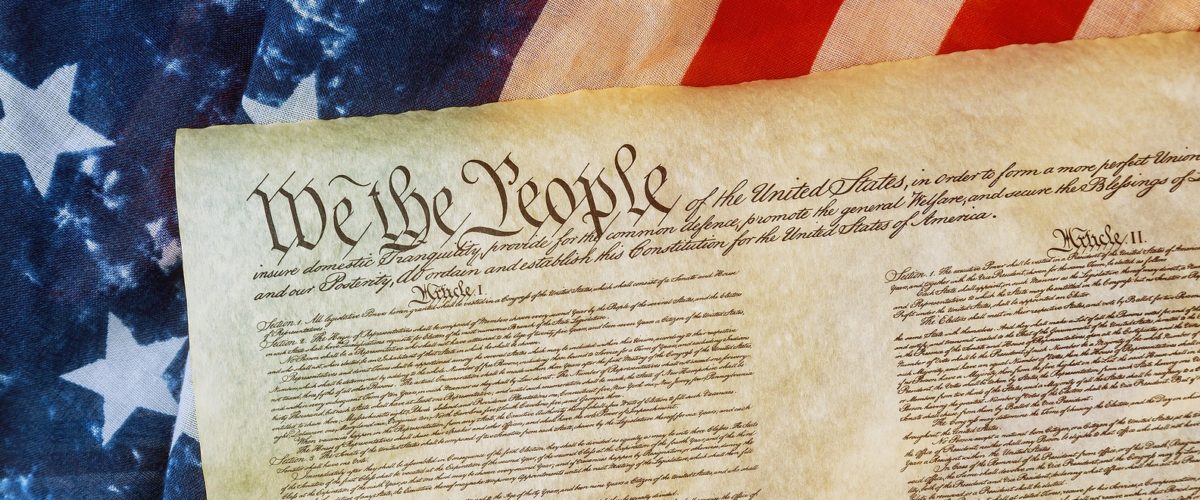What does freedom mean to you?
On July 26, former president and Republican presidential nominee Donald Trump told Christians at The Believers’ Summit, an event hosted by Christian nationalist advocacy group Turning Point USA: “Get out and vote. Just this time.”
The clip of his speech is going viral online because, rather than simply encouraging Christians to vote, Trump offered a motivation: Soon, they “won’t have to do it anymore.”
If he is elected, he explained, “you won’t have to vote anymore, my beautiful Christians … In four years, you don’t have to vote again. We’ll have it fixed so good, you’re not going to have to vote.”
His spokesman, Steven Cheung, told the New York Times the statement was “about uniting this country and bringing prosperity to every American.”
However, social media users on both sides of the political spectrum worry these remarks indicate plans to end American democracy as we know it. After all, revoking the right to vote is a common tactic of authoritarian regimes seeking to foster political and social control over their regions of power. And historically, this has not ended well. Is this, users wonder, an indicator the former president seeks to end democracy in the United States?
If politics are “fixed” to ensure we “don’t have to vote,” what could the future of American politics and life look like?
Voting throughout U.S. history
A broad look at voting history in the U.S. exemplifies the struggles and triumphs groups of all kinds have faced to secure this basic liberty.
Considering the right to vote, Americans can recall the long journey our country has embarked upon to ensure all citizens have a say in who governs them. A broad look at U.S. voting history exemplifies the struggles and triumphs groups of all kinds have faced to secure this basic liberty.
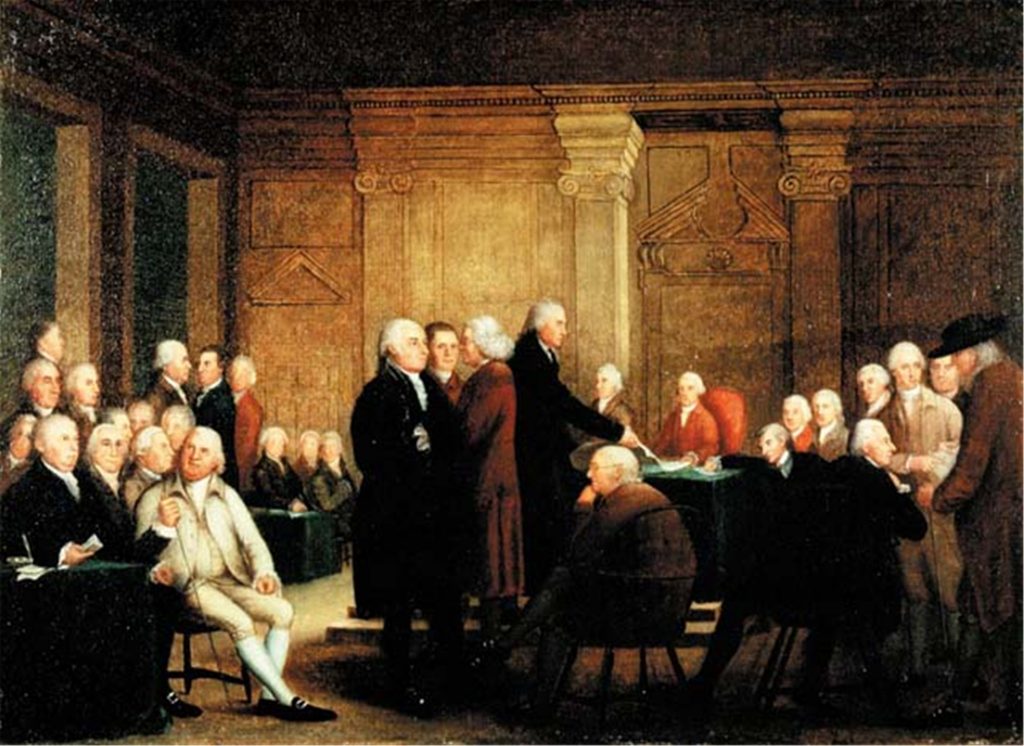
Continental Congress of 1776. (Photo/Wikipedia)
In 1776, founders signed the Declaration of Independence, providing a framework for voting rights by declaring the government should derive its power from “the Consent of the Governed.” Later, in 1788, the young nation adopted the U.S. Constitution, which left it up to individual states to determine their own voting standards.
For almost 100 years after this, property ownership mostly determined voting eligibility, creating a mostly wealthy, white and male class of voters. Not until 1870, when the 15th Amendment was ratified, did Black men get the right to vote. But Black voters faced suppression from things like poll taxes, literacy tests and grandfather clauses enacted by individual states until 1965, when the Voting Rights Act banned literacy tests and federally enforced the amendment.
Between 1870 and 1965, other minorities slowly gained the right to vote.
In 1920, the 19th Amendment gave women the right to vote. But it did not stop individual states from restricting this liberty from minority groups, like Black women. Not until the Voting Rights Act was passed were all women guaranteed the right to vote.
In 1925, Native American women and men received the right to vote under the Indian Citizenship Act. Despite being the native inhabitants of the land, the group did not previously have the right to vote.
Later, in 1943, the Chinese Exclusion Act of 1882, which barred Chinese immigrants from becoming citizens, was repealed. This made Chinese immigrants and their families eligible to naturalize and to become citizens, and in turn, to gain the right to vote.
In 1964, the 24th Amendment banned all poll taxes, ensuring economic status would not prevent anyone from voting.
After the Voting Rights Act of 1965, voting liberties continued to be extended for American citizens, including the ability of non-English speakers to vote (1975) and various efforts to increase voting accessibility.
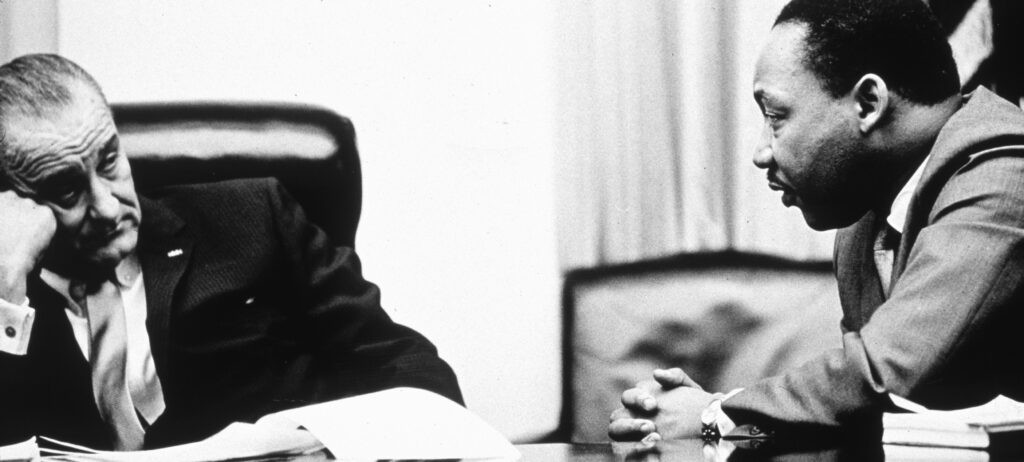
President Lyndon B Johnson discusses the Voting Rights Act with civil rights campaigner Martin Luther King Jr. in 1965. (Photo by Hulton Archive/Getty Images)
Still, voting is not always accessible for all Americans in all states. Some states continue to restrict voting by enacting restrictions such as Voter ID laws or limiting early voting, both of which cause difficulties for some populations in successfully casting their ballot.
Womanist theologies of justice
Although they historically have been last to receive civil liberties throughout U.S. history, Black women have been at the forefront of movements for justice and freedom, like the fight for voting rights.
Many of these Black women are religious, with a great deal of them being ordained ministers or religious leaders in their respective faith traditions. Some modern examples are women like Wilda Gafney, Melva Sampson, Shawn Copeland, Kelly Brown Douglas and a long list of others who believe their faith in Jesus empowers them to fight for justice for all.
They engage Womanist Theology, a mode of theological discourse often credited to the late theologian, ethicist and ordained Presbyterian minister Katie Geneva Cannon.
Emilie M. Townes, American Baptist clergywoman and former dean of Vanderbilt Divinity School, describes Womanist Theology as “a form of reflection that places the religious and moral perspectives of Black women at the center of its method.”
But further than simply acknowledging Black women’s experiences, she explains, Womanist Theology analyzes and reflects on how the intersections of social, political, cultural, historical and other important structures contribute to the systematic oppression of minorities like African Americans.
Womanist Theology equips itself to respond to everyday ethical problems, such as racism, sexism and homophobia, in robust and justice-seeking ways.
In turn, Womanist Theology equips itself to respond to everyday ethical problems, such as racism, sexism and homophobia, in robust and justice-seeking ways.
Notably, Catholic theologian Shawn Copeland explains in her book, Enfleshing Freedom, this is due to the fact Black women, especially in the United States, historically have experienced the most compounded forms of discrimination and oppression. Womanist theologies especially are effective in responding to these problems because they ground themselves in acknowledging, understanding and addressing the experiences of those most oppressed, Copeland says.
Justice cannot be achieved for anyone, she says, if we do not consider everyone in our labor toward it.
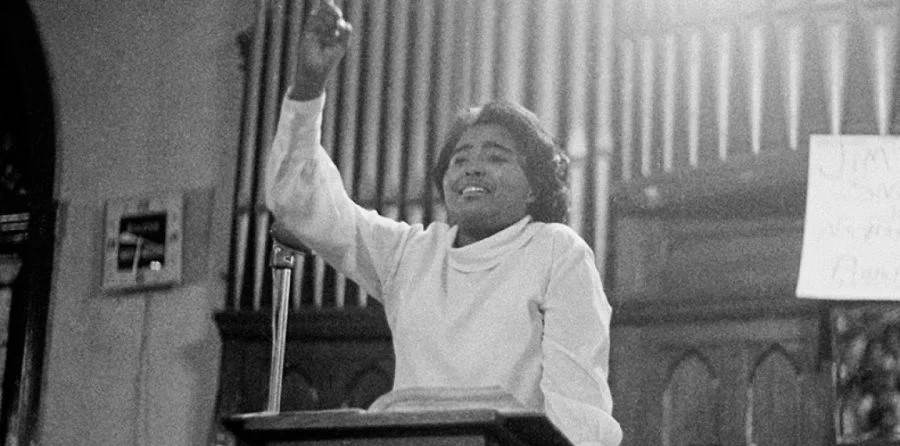
Prathia Hall at Brown Chapel AME Church in Selma, Ala., 1964. (Photo by Danny Lyon, archived at snccdigital.org.)
Prathia Hall, voting and ‘Freedom Faith’
In conversations about voting rights, one woman — Prathia Hall — can be remembered for her particularly Baptist and American understanding of freedom.
Hall was a civil rights activist and one of the first women ordained by the American Baptists. Scholars who study her work and ministry, such as Courtney Pace, author of Freedom Faith: The Womanist Vision of Prathia Hall, say Hall likely inspired Martin Luther King Jr.’s famous “I Have a Dream” speech.
King often chose Hall to speak at Student Non-Violent Coordinating Committee events, and she first uttered the phrase during a prayer vigil in September 1962, Pace reports. As public speakers and religious leaders, the two had a “preaching relationship” fostered as they worked to emphasize how God’s pursuit of justice for all people was at work in the Civil Rights Movement.
Among her accomplishments, Hall is known for her efforts to fight U.S. voter suppression during the Selma Voting Rights Campaign. Despite facing instances of discrimination and political violence on multiple occasions, she held steadfast to her vision of “Freedom Faith,” the belief God creates all humans to be free and assists and equips those who work for freedom.
Her particularly Womanist understanding of theology and American politics recognized the disparities in civil rights she and other Black women endured as experiences of discrimination that prohibited their ability to live freely. It also recognized the generations of African Americans and other minorities in the United States who encountered these disparities over time.
In response, her theological vision proclaimed the truth that her Christian faith provided: God’s children thrive most when they are free, because freedom is God’s creative intention. In turn, it is the duty of Christians to labor for that freedom when they see disparities in it, working with God’s empowering presence until it is fully realized.
For Hall, this labor culminated as a response to the voter suppression she saw happening in her communities. She was known for her preaching ability, in which she often used sermonic techniques to connect Christian values to themes of justice for her congregations. Hall also worked to encourage Black Americans to register to vote, and she taught potential registrants the skills needed to pass voter registrations tests — such as literacy — in Freedom Schools.
Her womanist vision of Freedom Faith included the right for all Americans, regardless of race, gender, ethnicity or other minority statuses, to have a say in who governs them.
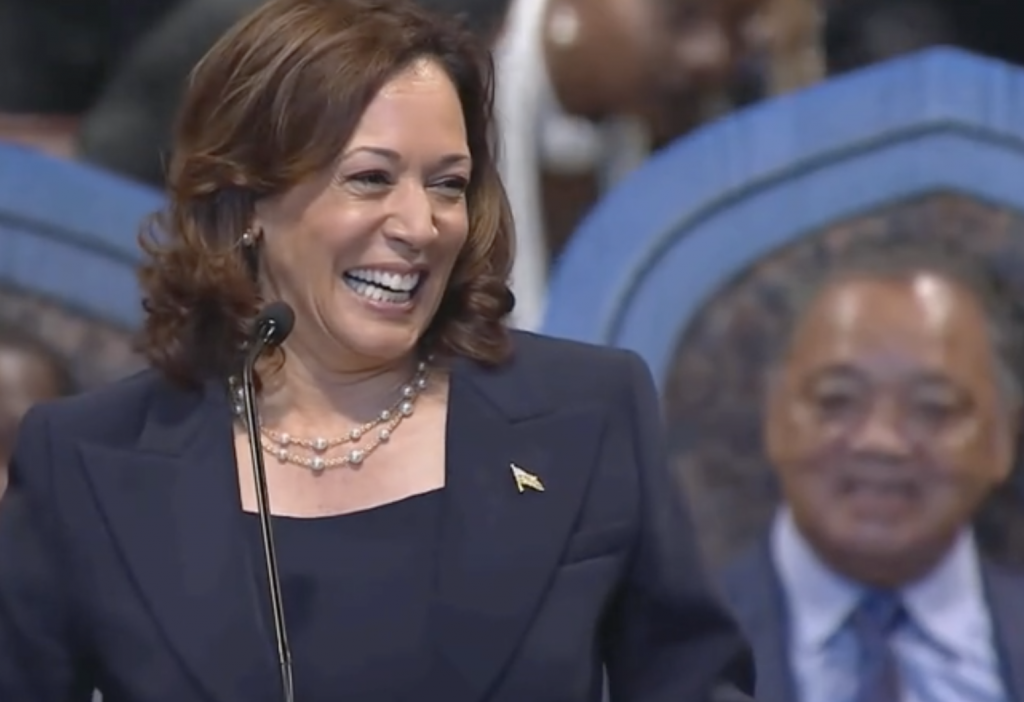
U.S. Vice President Kamala Harris speaks at the Rainbow PUSH Coalition convention as Jesse Jackson listens. (Screenshot from video)
Harris as a Black and Baptist woman
For the first time ever, this year’s election ticket will likely list a Black Baptist woman, Kamala Harris.
According to AP News, vice president Harris’ own theological beliefs are heavily inspired by Martin Luther King Jr. and the Black Baptist church, as well as her mother’s Indian religious faith. Both traditions champion nonviolent resistance in the fight for civil rights.
Freddie D. Haynes III, pastor of Friendship-West Baptist Church in Dallas, told AP News Harris “has always understood that Jesus and justice go together. Her spirituality has been informed by a sense of justice for those who are othered, disadvantaged and treated as second-class citizens.”
Much like Hall and King, Harris’ faith seems to be informed by theological frameworks that prioritize the struggles and experiences of the most disadvantaged and works toward freedom and justice for all. This starkly contrasts the growing sentiments of Christian nationalism, which seek to codify specific interpretations of Christianity into law, perhaps to the point Christians “won’t have to vote anymore.”
Instead, Freedom Faith offers a different way to blend religion and politics. It provides a lens for considering God’s creative purpose and value for all people, as well as utilizing faith as a tool of empowerment for us and our siblings in Christ, not as a method to control them.
So, what does freedom mean to you? Our Womanist teachers might advise us to get to the polls and exercise our right to vote, so our daughters and granddaughters can, too.
Related articles:
Tired of reading only male perspectives on Christian sexuality? Here are 14 women you ought to read
White House event celebrates the diversity of Black America
Learn about the kinds of oppression that are different than your oppression, McMickle urges
In Georgia, demonizing Black Liberation Theology yet again

